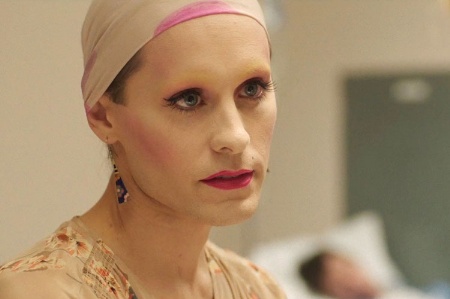Source: Anne Marie Fox/Focus Features
Road to redemption: the nicest thing anyone says of flawed, reluctant hero Ron Woodroof (played by Matthew McConaughey) is that he is ‘handsome, in a Texas dumb hick white trash kinda way’
Dallas Buyers Club
Directed by Jean-Marc Vallée
Starring Matthew McConaughey, Jared Leto and Jennifer Garner
On general release in the UK from 7 February
It speaks of the potential, in even the most hardened, to find renewal, to improve the lives of others, and to assimilate
“Humankind cannot bear very much reality”: that has never been truer than in mainstream US cinema of the 21st century. Virtually everything in the multiplexes these days is fantasy.
Dallas Buyers Club makes an honest attempt to aspire to something different – dirty realism. Shot in vérité style with a handheld camera, often in poorly lit locations including a crummy motel in Dallas where the walls are a shade of cranberry, it follows the journey of Ron Woodroof (played by Matthew McConaughey), a Texan who in 1985 was diagnosed with Aids and given 30 days to live. Having tried the only drug therapy of the day, AZT, Woodroof rejected it as “toxic” and instead settled on an alternative: a combination of multivitamins, proteins and aloe vera. That, and a number of pharmaceuticals not approved by the Food and Drug Administration (FDA), kept him alive for another seven years.
Yet Woodroof did not keep these discoveries to himself. He made available his unconventional treatment to other Aids sufferers using the mechanism of a buyers’ club – he charged $400, then supplied them with as much medicine as they needed, free of charge, often giving them cutting-edge drugs in contravention of FDA guidelines.
He was no saint, and the buyers’ club was not a philanthropic enterprise. The film includes a scene in which he refuses to give a young man discounted membership. When told that another club in Florida has lower fees, he responds: “Go back to the fucking Sunshine State!”
Any film about the terminally ill lumbers itself with the challenge of avoiding sentimentality, and to that end the makers of Dallas Buyers Club do their best to make Woodroof as ornery as possible. The nicest thing anyone says of him is that he is “handsome, in a Texas dumb hick white trash kinda way”. Other than that, he is a dustbin of unlovability: he calls Arabs “sand niggers”, describes Rock Hudson as a “cocksucker”, and resorts to booze, cocaine and cut-price hookers.
When his doctor tells him he has full-blown Aids, he responds: “I ain’t no faggot, motherfucker! Call me a faggot, I’ll whip your ass, boy. You must have mixed up the blood samples with some daisy-puller because that shit ain’t me!” When it is suggested he join a support group, he responds: “I’m dying. You telling me to get a hug from a bunch of faggots?” (One of the surprises of living in contemporary America is the continuing prevalence of such bigotry. And in a society so deeply divided, films like this will inevitably have a force lacking in those where gay culture has been better assimilated.)
Dallas Buyers Club is a story of redemption: in spite of himself, Woodroof turns into a reluctant campaigner for the right of Aids victims to determine their own treatment, in the course of which he denounces the manner by which “the pharma companies pay the FDA to push their product”. This, of course, is the central flaw in American healthcare; it is a cash cow for drug manufacturers and insurance men.

McConaughey turns in one of his best performances so far, and he isn’t the kind of actor to take it easy. He lost 47lbs while preparing for the role. Throughout Dallas Buyers Club, he makes the wise decision to stay in touch with his character’s inner bastard (at one point, seeing a club member leaning on his Cadillac, he snarls, “Off the Caddy!”). This is faithful to the ungenerousness of the 1980s, that low, dishonest decade – and is reflected in Woodroof’s dingy motel room as much as the cold, sterile clinic where he receives his diagnosis from two masked physicians. It is the film’s achievement to evoke an era in which society’s fear of an entire class of people defined by their sexual orientation was articulated in its reluctance to license new drug therapies or permit sufferers to experiment with their own.
In that environment, it argues, the only sane response is to stick one’s head out of the window and shout, “I’m mad as hell and I’m not going to take it any more!” Except that Woodroof went one step further – as he put it, “I prefer to die with my boots on.” Dallas Buyers Club is, in other words, a celebration of that distinctly American quality, anarchistic self-reliance.
That’s probably why the film has resonated in a country more polarised than ever on the issue of healthcare, its point being that, however inept the system, determined individuals can always do something to make things better. That mythic journey occurs in tandem with another: the one that takes Woodroof from bigoted intolerance to radicalised activism. In pursuit of essentially selfish ends he finds himself suing the FDA for the right to treat Aids patients with unapproved (but effective) pharmaceuticals. McConaughey embodies that experience without suggesting moral superiority; Woodroof wants only to survive for as long as he can, and to be a successful businessman. (“Goddamn,” he tells one of the Japanese partners, “I like your style, Hiroshi!”)
The supporting cast is equally strong. Jared Leto’s Rayon, a transgender woman, is the perfect foil for Woodroof’s bigotry and an unlikely ally. Jennifer Garner as Woodroof’s doctor, Eve Saks, who moves from opposing the buyers’ club to working on its behalf, offers some telling remarks about the flawed American health system. After a meeting with the company that makes AZT, she turns to a colleague and asks: “Doesn’t it drive you a little bit crazy to see these guys talking about curing the sick while flashing their gold Rolexes?” This kind of remark is bound to have most impact in a US context, but it is a warning to any society that flirts with the idea of exchanging a nationalised health service for one owned by millionaire plutocrats.
Inevitably this is going to make Dallas Buyers Club sound preachy, but there is more to it than righteous indignation. It would be an interestingly subversive choice for a Valentine’s Day movie. It lacks dei ex machina, clear-cut moral questions or neat answers, and its sex scenes are unglamorous, sweaty and painful. But it is also a kind of love story. It speaks of the potential, in even the most hardened, to find renewal, to improve the lives of others, and to assimilate. There is nothing exultant about it, but it does profess what is essentially an optimistic vision.
Is that a weakness? British audiences, who have largely relinquished conviction in the power of individuals to do battle with politicians, might think so. Yet in that respect, as in others, the film exerts restraint, perhaps because it is directed not by an American but by a French-Canadian, Jean-Marc Vallée. There is nothing triumphalist in its tone; it merely prefers a flawed, reluctant hero to one we can admire unreservedly, just as it prefers to depict a fallen, chaotic world to one in which justice is invariably done.
Register to continue
Why register?
- Registration is free and only takes a moment
- Once registered, you can read 3 articles a month
- Sign up for our newsletter
Subscribe
Or subscribe for unlimited access to:
- Unlimited access to news, views, insights & reviews
- Digital editions
- Digital access to THE’s university and college rankings analysis
Already registered or a current subscriber?

